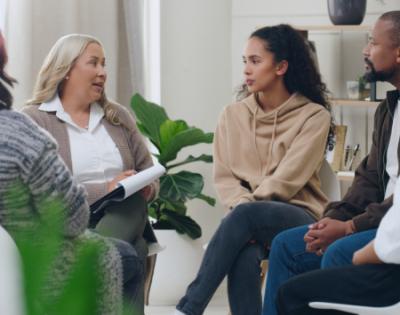
Below is an excerpt from an IOP Counselor.
In my experience working in an Intensive Outpatient Program, I have noticed that most of our clients come into the group with high anxiety related to being in a new setting with new people and not knowing what to expect exactly. In general, it takes about 2-4 weeks for group members to begin feeling comfortable and allowing themselves to be truly vulnerable, not only with themselves but with their fellow group members. Once this takes place and they feel the support, comfort, and validation from the group, there is a definitive shift in their perception of the group, as well as in people.
Here, they learn that there are people out there who can offer unconditional support and that they deserve all of these things, which then allows them the courage and strength to start making changes. This can come in the form of utilizing more self-compassion, practicing coping skills in a new way or with more optimism, setting boundaries with people and themselves where they have not been able to before, communicating their needs, wants, and emotions in healthier ways that better allow them to get those needs met, and so much more.
There are still days when the work is hard or they leave the group feeling heavier, but I think those days are the most impactful, although they do not outweigh the days when they leave feeling lighter and accomplished. Typically, by the time they are ready to leave the group, members have made significant progress toward their personal and treatment goals. They find themselves feeling more confident in their ability to cope with their mental health struggles, motivated to continue improving and trying new things, an increase in their belief that they are ready to move forward with other forms of treatment to better help them, whether that is individual therapy, trauma work, DBT, or other groups, as well as improving their identification of unhelpful thoughts that have kept them stuck in the past.
They often experience a bittersweet feeling when they are graduating because they feel prepared and ready, yet saddened to leave the group that offered them so much support through difficult times. Yet, this also shows them, again, that there are people out there who are willing to offer them these same things as long as they are willing to look for them and continue to teach others how to treat them.
Success Story:
I think most recently a big success was with a client who came to the group feeling inadequate in nearly every way, even in the sense that they thought their problems weren’t as important as other group members’ due to the belief they created all of them themselves. They were very harsh on themselves, had family issues they were going through, struggled to even identify their own emotions, and had nearly no self-compassion for themselves.
However, as they progressed in the group, they intentionally practiced these skills outside of the group setting, and with this, not only made great strides but also motivated and inspired others in the group as well. One group member even shared a story about how they thought something they were doing was stupid but stopped and told themselves that the initial group member would not think it was stupid. That impacted the group member a lot. They worked to start checking in with themselves and identifying their emotions, as well as asking themselves what they needed in the moment.
Self-compassion was at the forefront of their brain more than it had ever been, and they were even able to praise themselves several times throughout the process. When they left the group, they told me they felt hope for the first time in a long time.




